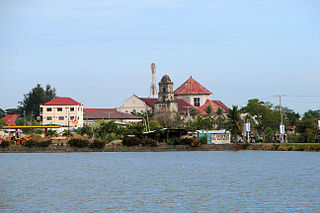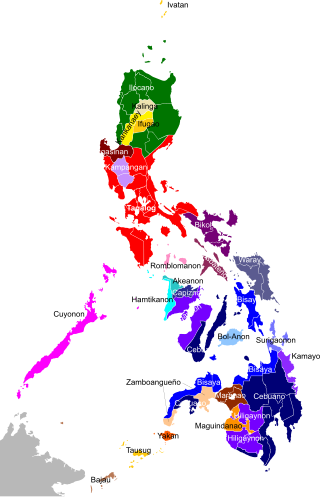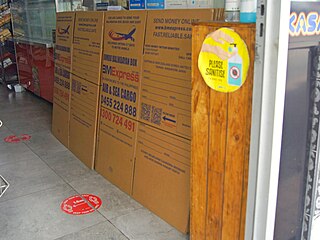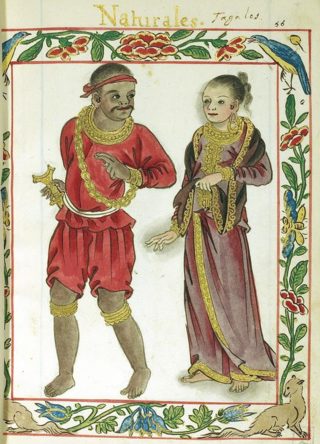
The East Indies is a term used in historical narratives of the Age of Discovery. The Indies broadly refers to various lands in the East or the Eastern Hemisphere, particularly the islands and mainlands found in and around the Indian Ocean by Portuguese explorers, soon after the Cape Route was discovered. In a narrow sense, the term is used to refer to the Malay Archipelago, which today comprises the Philippine Archipelago, Indonesian Archipelago, Borneo, and New Guinea. Historically, the term was used in the Age of Discovery to refer to the coasts of the landmasses comprising the Indian subcontinent and the Indochinese Peninsula along with the Malay Archipelago.

Binmaley, officially the Municipality of Binmaley, is a 1st class municipality in the province of Pangasinan, Philippines. According to the 2020 census, it has a population of 86,881 people.
Pinoy is a common informal self-reference used by Filipinos to refer to citizens of the Philippines and their culture as well as to overseas Filipinos in the Filipino diaspora. A Pinoy who has any non-Filipino foreign ancestry is often informally called Tisoy.
Tagalog Republic is a term used to refer to two revolutionary governments involved in the Philippine Revolution against the Spanish Empire and the Philippine–American War. Both were connected to the Katipunan revolutionary movement.

Dulag, officially the Municipality of Dulag, is a 3rd class municipality in the province of Leyte, Philippines. According to the 2020 census, it has a population of 48,992 people.
Filipinos have various naming customs. They most commonly blend the older Spanish system and Anglo-American conventions, where there is a distinction between the "Christian name" and the "surname". The construct containing several middle names is common to all systems, but the multiple "first" names and only one middle and last name are a result of the blending of American and Spanish naming customs.

The Philippines is inhabited by more than 182 ethnolinguistic groups, many of which are classified as "Indigenous Peoples" under the country's Indigenous Peoples' Rights Act of 1997. Traditionally-Muslim peoples from the southernmost island group of Mindanao are usually categorized together as Moro peoples, whether they are classified as Indigenous peoples or not. About 142 are classified as non-Muslim Indigenous people groups, and about 19 ethnolinguistic groups are classified as neither Indigenous nor Moro. Various migrant groups have also had a significant presence throughout the country's history.

Pasalubong is the Filipino tradition of travellers bringing gifts from their destination to people back home. Pasalubong can be any gift or souvenir brought for family or friends after being away for a period of time. It can also be any gift given by someone arriving from a distant place.

The traditional music of the Philippines reflects the Philippines' diverse culture, originating from more than 100 ethnolinguistic groups and shaped by a widely varying historical and sociocultural milieu.

A balikbayan box is a corrugated box containing items sent by overseas Filipinos. Though often shipped by freight forwarders specializing in sending balikbayan boxes by sea, such boxes are also commonly brought by Filipinos returning to the Philippines via air.

"Bayan Ko" is one of the most recognizable patriotic songs of the Philippines. It was written in Spanish by the revolutionary general José Alejandrino in light of the Philippine–American War and subsequent American occupation, and translated into Tagalog some three decades later by the poet José Corazón de Jesús.

In Philippine history, the Tagalog bayan of Maynila was one of the most cosmopolitan of the early historic settlements on the Philippine archipelago. Fortified with a wooden palisade which was appropriate for the predominant battle tactics of its time, it lay on the southern part of the Pasig River delta, where the district of Intramuros in Manila currently stands, and across the river from the separately-led Tondo polity.

In early Philippine history, barangay is the term historically used by scholars to describe the complex sociopolitical units that were the dominant organizational pattern among the various peoples of the Philippine archipelago in the period immediately before the arrival of European colonizers. Academics refer to these settlements using the technical term "polity", but they are usually simply called "barangays".
The Commission on Filipinos Overseas (CFO) is an agency of the government of the Philippines under the Office of the President of the Philippines. CFO was established on June 16, 1980, through the enactment of Batas Pambansa Blg. 79.

Oscar Hilman, is a Filipino American, Brigadier General or BG, and US Army Commander of the Heavy Armor Brigade at Joint Base Balad and Logistics Area Anaconda aka Camp Anaconda, formerly known as Al-Bakr Air Base in Iraq. In Iraq, he was tasked to prevent troop and allied forces withdrawals from Camp Anaconda, one of the largest US military bases in Iraq. In a series of town hall meetings, he spoke to the Filipino workers—often in Tagalog—and persuaded them to stay put by assuring them of their safety in camp. To show good faith, he gave the contractors base privileges, a move that was approved by the US chain of command.
Kedatuan were historical semi-independent city-states or principalities throughout ancient Maritime Southeast Asia in the present-day Philippines, Indonesia, and Malaysia. In a modern Indonesian/Malay sense, they could be described as kingdoms or polities. The earliest written record mentioning the term kadatuan was the 7th-century Srivijayan Telaga Batu and Kota Kapur inscription from Sumatra, Indonesia.

The Sentro Rizal is a Philippine government-sponsored organization whose main objective is the global promotion of Filipino art, culture, and language. Established by virtue of the National Cultural Heritage Act of 2009, its headquarters is located at the National Commission for Culture and the Arts (NCCA) office in Intramuros, Manila. Sentro Rizal aims to promote Philippine arts, culture, and language throughout the world through the establishment of Philippine centers in various countries which initiate and organize cultural training programs and activities for overseas Filipinos.

Tagalog profanity can refer to a wide range of offensive, blasphemous, and taboo words or expressions in the Tagalog language of the Philippines. Due to Filipino culture, expressions which may sound benign when translated back to English can cause great offense; while some expressions English speakers might take great offense to can sound benign to a Tagalog speaker. Filipino, the national language of the Philippines, is the standard register of Tagalog, so as such the terms Filipino profanity and Filipino swear words are sometimes also employed.
Anthony Angel Labrusca Jr. is an American actor, model, and singer based in the Philippines. Labrusca first gained his popularity via a McDonald's Philippines TV ad in 2016, Tuloy Pa Rin.
As a historical colony of the United States, the Philippine English lexicon shares most of its vocabulary from American English, but also has loanwords from native languages and Spanish, as well as some usages, coinages, and slang peculiar to the Philippines. Some Philippine English usages are borrowed from or shared with British English or Commonwealth English, for various reasons. Due to the influence of the Spanish language, Philippine English also contains Spanish-derived terms, including Anglicizations, some resulting in false friends, such as salvage and viand. Philippine English also borrows words from Philippine languages, especially native plant and animal names, and cultural concepts with no exact English equivalents such as kilig and bayanihan. Some borrowings from Philippine languages have entered mainstream English, such as abaca and ylang-ylang.











